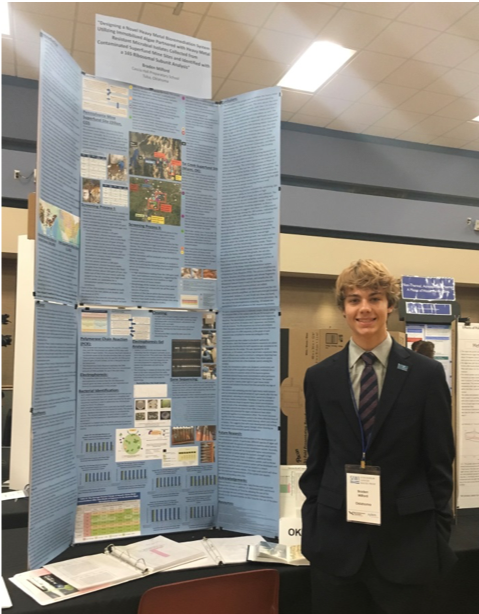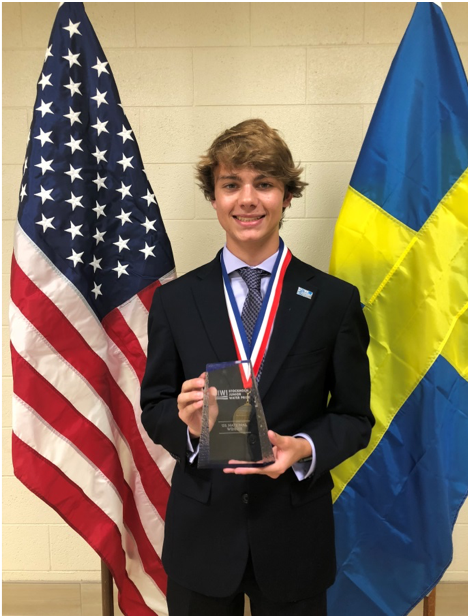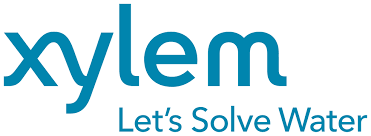Tulsa, Okla. Student Wins Xylem-Sponsored U.S. Stockholm Junior Water Prize, Will Represent the U.S. in International Competition
The Water Environment Federation (WEF) announced this week that Braden Milford of Tulsa, Oklahoma has won the 2018 U.S. Stockholm Junior Water Prize (SJWP), the nation’s most prestigious youth competition for water-related research sponsored by Xylem. Students from 49 states and Puerto Rico competed for the prize from June 16-17 at University of North Carolina at Charlotte. The SJWP aims to increase students’ interest in water issues, research, and careers, as well as to raise awareness about global water challenges. The competition is open to projects focused on improving water quality, water resource management, water protection, and drinking water and wastewater treatment.
U.S. Stockholm Junior Water Prize Winner
As this year’s winner of the SJWP, Braden Milford was awarded a $10,000 scholarship and an all-expense paid trip to Stockholm, Sweden at the end of August for the opportunity to compete in the International Stockholm Junior Water Prize competition. For Milford’s award-winning project, he developed a heavy metal bioremediation system to remove heavy metals from contaminated abandoned mine sites. To do so, he identified bacteria along streams near abandoned mine sites that showed potential for remediation and he then partnered his bacteria species with algae to remove heavy metals from the stream. Milford’s love for the outdoors inspired his project, but what drew him into heavy metals and contamination was when he was hiking in Colorado this past summer. He witnessed first-hand all the damage that has been done to the water in that area, so Milford decided to take action.
Runners-Up
From Kentucky, Anjali Chadha was a runner-up for her project on developing a “Fully-Automated 3-D Printed IoT Sensor for Arsenic Detection in Groundwater.” This device is cost-effective and user-friendly, storing the groundwater arsenic ppb level results on the cloud. Chadha says she wants to continue her research next year as a high school senior, taking this project to “its final resting place.” One of the challenges she faced was that she didn’t realize that there were different types of 3-D printing that were much more effective in storing water than others. As she continued working on her project, she found the correct material and then presented her project at the Stockholm Junior Water Prize. She says it’s a great honor and opportunity to just be here and receiving a $1,000 scholarship as runner-up feels amazing.
High school senior Michelle Xing from New York was another runner-up who received a $1000 scholarship. She was inspired to do her project on environmentally friendly and cost-efficient lead-removal methods after the Flint, Michigan water crisis. She proposed that nitric-acid oxidation compared to TEMPO-mediated oxidation was a more successful method because it uses fewer chemicals for real-world use. Xing said that when she first started this project, a lot of the techniques were very complex and she had no idea how to do any of it before starting. However, after researching and learning more about the techniques at Professor Benjamin Hsiao’s lab at Stony Brook University, she said that she would celebrate with her mentors, who have “helped me get to where I am.”
Additional Awards
Madeline Kane of Nebraska is the recipient of the Xylem Bjorn von Euler Innovation in Water Scholarship. Her project topic on coral bleaching was inspired by her passion for scuba diving and long-time interest in coral. She noticed while diving and revisiting reefs how drastic the changes in coral have been over the past year and said she wanted to “do something that was a new idea and unique as a solution to the problem.” Through Kane’s research, she found a new way to solve coral bleaching through natural things such as Crustose Coroline Algae if grown in different conditions. She did a lot of community outreach to third grade classes, teaching them about different coral bleaching, which made her want to go “the extra step into the community.”
Helen Laird of Alaska won the James L. Condon Recognition for Environmental Stewardship award.
About Xylem Watermark
Xylem Watermark, Xylem’s corporate citizenship program, provides and protects safe water resources for many of the world’s most vulnerable communities and educates individuals around the globe about water issues. This social commitment reflects Xylem’s ethos of valuing the “triple bottom-line:” financial, environmental and social. The company firmly believes in the notion of doing well by doing good, and dedicates resources to initiatives that demonstrate its commitment.
Xylem Watermark was founded in 2008 and, with its six nonprofit partners, has provided clean water and sanitation solutions to over three million people in 38 countries. Xylem launched its first Global Month of Service in October 2016 to provide a focused time to inspire employees to get involved and bring the mission of Xylem Watermark to their communities. In 2017, Xylem Watermark launched the Make Your Mark 30 Day Challenge to engage employees in solving global and local water issues in ways about which they are passionate.
To learn more about Xylem Watermark, please visit http://www.xylemwatermark.com.



